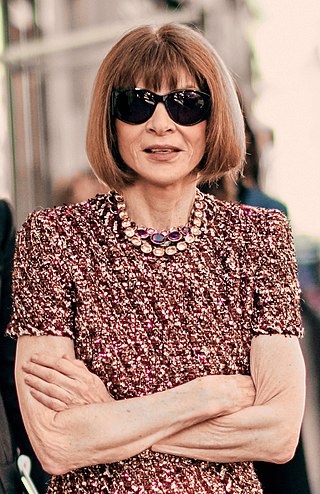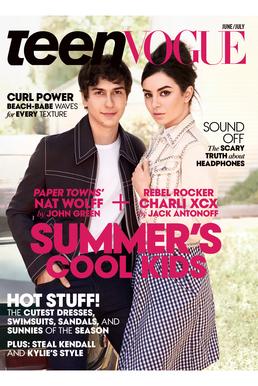Related Research Articles
Teen magazines are magazines aimed at teenage readers. They usually consist of gossip, news, fashion tips and interviews and may include posters, stickers, small samples of cosmetics or other products and inserts.

Crisis was a British comic anthology published by Fleetway Publications from 17 September 1988 to October 1991, initially fortnightly and later monthly. Designed to appeal to older readers than other Fleetway titles in order to take advantage of a boom in interest in 'adult' comics, Crisis featured overtly political and complex stories; one issue was even produced in conjunction with Amnesty International.

Dame Anna Wintour is a British and American media executive based in New York City who has served as editor-in-chief of Vogue since 1988. Wintour has also served as global chief content officer for Condé Nast since 2020, where she oversees Condé Nast magazines worldwide, and concurrently serves as artistic director of Condé Nast and global editorial director of Vogue. With her trademark pageboy bob haircut and dark sunglasses, Wintour is regarded as the most powerful woman in publishing and has become an important figure in the fashion world. Wintour is praised for her skill in identifying emerging fashion trends, but her reportedly aloof and demanding personality has earned her the nickname "Nuclear Wintour".

Smash Hits was a British music magazine aimed at young adults, originally published by EMAP. It ran from 1978 to 2006, and, after initially appearing monthly, was issued fortnightly during most of that time. The name survived as a brand for a spin-off digital television channel, which was later renamed Box Hits, and website. A digital radio station was also available but closed on 5 August 2013.
Annual publications, more often simply called annuals, are periodical publications appearing regularly once per year. Although exact definitions may vary, types of annuals include: calendars and almanacs, directories, yearbooks, annual reports, proceedings and transactions and literary annuals. A weekly or monthly publication may produce an Annual featuring similar materials to the regular publication. Some encyclopedias have published annual supplements that essentially summarize the news of the past year, similar to some newspaper yearbooks.

"Computer Warrior" is a British comic strip, appearing in titles published by IPC Magazines. The story was published in the anthology Eagle from 6 April 1985 to January 1994, initially written by John Wagner and drawn by John Cooper. The story followed the eponymous Computer Warrior - a video game expert called Bobby Patterson, who gained the ability to enter computer games. Both fictional and real games were featured in the story, which ran until Eagle was cancelled in 1994.

Tiger was a weekly British comics periodical published by Amalgamated Press, Fleetway Publications and IPC Magazines from 11 September 1954 to 30 March 1985. The title was initially launched in a large tabloid size to mimic newspapers; while it featured some action-adventure stories Tiger contained a large number of sport strips. The most famous of these was "Roy of the Rovers", which debuted in the first issue and was the comic's most popular feature, eventually transferring to its own comic in 1975. Tiger would go on to become one of the company's longest-running titles, notching 1573 issues before being merged with Eagle in 1985. Over the course of its run, Tiger featured columns by numerous famous sports figures, including Ian Botham, Geoff Boycott, Tony Greig, Trevor Francis, and Charlie Nicholas.
The Amalgamated Press (AP) was a British newspaper and magazine publishing company founded by journalist and entrepreneur Alfred Harmsworth (1865–1922) in 1901, gathering his many publishing ventures together under one banner. At one point the largest publishing company in the world, AP employed writers such as Arthur Mee, John Alexander Hammerton, Edwy Searles Brooks, and Charles Hamilton. Its subsidiary, the Educational Book Company, published The Harmsworth Self-Educator, The Children's Encyclopædia, and Harmsworth's Universal Encyclopaedia. The company's newspapers included the Daily Mail, the Daily Mirror, The Evening News, The Observer, and The Times. At its height, AP published over 70 magazines and operated three large printing works and paper mills in South London.

TI Media was a consumer magazine and digital publisher in the United Kingdom, with a portfolio selling over 350 million copies each year. Most of its titles now belong to Future plc.
The Steel Claw was one of the most popular comic book heroes of British weekly adventure comics of the 1960s and 1970s. The character was revived in 2005 for Albion, a six-issue mini-series published by the Wildstorm imprint of DC Comics.

Teen Vogue is an American online publication, formerly in print, launched in January 2003, as a sister publication to Vogue, targeted at teenage girls and young women. Like Vogue, it included stories about fashion and celebrities. Since 2015, following a steep decline in sales, the magazine cut back on its print distribution in favor of online content, which has grown significantly. The magazine had also expanded its focus from fashion and beauty to include politics and current affairs. In November 2017, it was announced Teen Vogue would cease in print and continue online-only as part of a new round of cost cuts. Other publications would also follow and go digital, such as InStyle. The final print issue featured Hillary Clinton on the cover, and was on newsstands on December 5, 2017.

Lion was a weekly British comics periodical published by Amalgamated Press from 23 February 1952 to 18 May 1974. A boys' adventure comic, Lion was originally designed to compete with Eagle, the popular weekly comic published by Hulton Press that had introduced Dan Dare. It debuted numerous memorable characters, including Captain Condor, Robot Archie, Paddy Payne and the Spider. Lion lasted for 1,156 issues before being merged with stablemate Valiant.

Jackie was a weekly British magazine for girls. The magazine was published by D. C. Thomson & Co. Ltd of Dundee from 11 January 1964 until its closure on 3 July 1993 — a total of 1,538 issues. Jackie was the best-selling teen magazine in Britain for ten years, particularly in the decade of the 1970s.

Men Only is a British magazine title that originated in 1935 as a pocket-sized men's magazine. It became a standard-sized pin-up magazine in the 1950s and was relaunched in 1971 by Paul Raymond Publications as a soft-core pornographic magazine.
Rugby World is a monthly rugby union magazine running since October 1960. It is published monthly by Future plc and edited by Owain Jones who took over from long-standing editor Paul Morgan in January 2012. Paul Morgan was long considered a leader in the industry, the magazine is the world's top-selling rugby magazine and has benefited from a worldwide rise in interest in rugby following the 2003 Rugby Union World Cup.
Just Seventeen, often referred to as J-17, was a fortnightly magazine aimed at teenage girls, published by Emap from October 1983 to April 2004. A special preview edition was given away free with sister magazine Smash Hits on 13 October 1983, with the first issue published the week after on 20 October. It had become a weekly publication by early 1986. It quickly became the UK's market-leading teen-girl magazine until the launch of Sugar in 1994, after which sales began to fall. In 1997, the magazine was changed to a monthly format in response to declining circulation, and the magazine was finally closed in 2004 after losing a third of its readership.
Teen now is a monthly magazine for teenage girls published by Time Inc. UK. It is a spin-off from the entertainment magazine NOW. The editor is music journalist Marie-Claire Giddings, who co-wrote the biography of the winner of the first series of Pop Idol, Anything is Possible, with its subject, Will Young.
City Magazines was a British publisher of weekly comics and men's magazines that operated from the mid-1950s to the mid-1970s. The company's most notable publications were comics magazines based on licensed television properties, including TV Century 21 and Lady Penelope, both of which featured comics based on Gerry Anderson's Century 21 Productions Supermarionation shows.
British girls' comics flourished in the United Kingdom from the 1950s through the 1970s, before beginning to decline in popularity in the 1980s and 1990s. Publishers known for their girls' comics included DC Thomson and Fleetway/IPC. Most titles appeared weekly, with the content primarily in picture-story format. The majority of the stories were serialized, with two or three pages per issue, over eight to twelve issues. They were marketed toward young teen girls.

Eagle, sometimes referred to as The New Eagle and known at various points in its life as Eagle and Scream!, Eagle and Tiger, Eagle and Battle, Eagle and M.A.S.K. and Eagle and Wildcat, was a British boys' adventure comic published by IPC Magazines from 27 March 1982 to January 1994. A revival of the famous Eagle, the title was initially a weekly publication until turning into a monthly in May 1991. The title was finally cancelled in January 1994, after 505 issues.
References
- ↑ Janice Winship (Winter 1985). "'A Girl Needs to Get Street-Wise': Magazines for the 1980s". Feminist Review (21): 25–46. doi:10.2307/1394838. JSTOR 1394838.
- ↑ Ann Gough-Yates (2003). Understanding Women's Magazines: Publishing, Markets and Readership. London and New York: Routledge. p. 82. Retrieved 22 September 2015.
- 1 2 3 4 Tony Quinn. "Women's monthly magazines at". Magforum. Retrieved 22 July 2011.
- ↑ "Women's monthly magazines: 19 to Cosmopolitan," magforum. Retrieved Jan. 14, 2021.